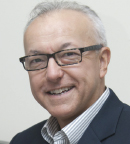
George Q. Daley, MD, PhD
George Q. Daley, MD, PhD, a leader in stem cell science and cancer biology whose work spans the fields of basic science and clinical medicine, will become the next Dean of the Faculty of Medicine at Harvard Medical School. He will begin his duties on January 1, 2017.
Dr. Daley is currently Professor of Biological Chemistry and Molecular Pharmacology and the Robert A. Stranahan Professor of Pediatrics at Harvard Medical School as well as Director of the Stem Cell Transplantation Program at Boston Children’s Hospital and the Dana-Farber Cancer Institute. He is also an investigator of the Howard Hughes Medical Institute.
A former Chief Resident in Medicine at Massachusetts General Hospital, Dr. Daley maintained an active clinical practice in hematology/oncology at Mass General and then at Boston Children’s until assuming his administrative role as Director of the Stem Cell Transplantation Program and Associate Chief of the Division of Pediatric Hematology/Oncology at Boston Children’s and Dana-Farber. He also serves as Associate Director of the broader Stem Cell Program based at the Dana Farber/Boston Children’s Cancer and Blood Disorders Center, which he helped to launch.
Dr. Daley has been a member of the faculty of the Harvard–Massachusetts Institute of Technology (MIT) Division of Health Sciences and Technology (HST) for over 20 years. He is a founding member of the Executive Committee of the Harvard Stem Cell Institute, and since 2009, he has been an associate member of the Broad Institute of Harvard and MIT and a core faculty member of the Manton Center for Orphan Disease Research at Boston Children’s.
Research Focus
Dr. Daley’s research focuses on the use of mouse and human disease models to identify mechanisms that underlie blood disorders and cancer. His lab aims to define fundamental principles of how stem cells contribute to tissue regeneration as well as repair and improve drug and transplantation therapies for patients with malignant and genetic bone marrow disease.
Beyond his research, Dr. Daley has been a principal figure in developing international guidelines for conducting stem cell research and for the clinical translation of stem cells, particularly through his work with the International Society for Stem Cell Research. He has also testified before Congress and spoken in forums worldwide on the scientific and ethical dimensions of stem cell research and its promise in treating disease.
Important contributions from the Daley laboratory have included the creation of customized stem cells to treat genetic immune deficiency in a mouse model (together with Rudolf Jaenisch, MD); the differentiation of germ cells from embryonic stem cells; the generation of disease-specific pluripotent stem cells by direct reprogramming of human fibroblasts; and demonstration of the role of the LIN28/let-7 pathway in cancer. In past research, he demonstrated the central role of the BCR/ABL oncoprotein in human chronic myelogenous leukemia, work that provided critical target validation for development of imatinib.
Other Achievements
Dr. Daley was an inaugural winner of the National Institutes of Health Director’s Pioneer Award for highly innovative research (2004). His numerous honors include the American Philosophical Society’s Judson Daland Prize for achievement in patient-oriented research; the American Pediatric Society’s E. Mead Johnson Award for contributions to stem cell research; the American Society of Hematology’s E. Donnall Thomas Prize for advances in human-induced pluripotent stem cells; and the International Chronic Myeloid Leukemia Foundation’s Janet Rowley Prize for outstanding lifetime contributions to the understanding and/or treatment of the disease. He is an elected member of the National Academy of Medicine and the American Society for Clinical Investigation, among other professional societies.
Dr. Daley earned his doctorate at MIT, working in the laboratory of David Baltimore, PhD, at the MIT-affiliated Whitehead Institute for Biomedical Research. He received his medical degree from Harvard Medical School. He then pursued clinical training in internal medicine at Mass General and was a Clinical Fellow at Brigham and Women’s and Boston Children’s hospitals. While running a laboratory as a Whitehead Fellow at the Whitehead Institute, he joined the Harvard faculty as Assistant Professor in 1995. ■

